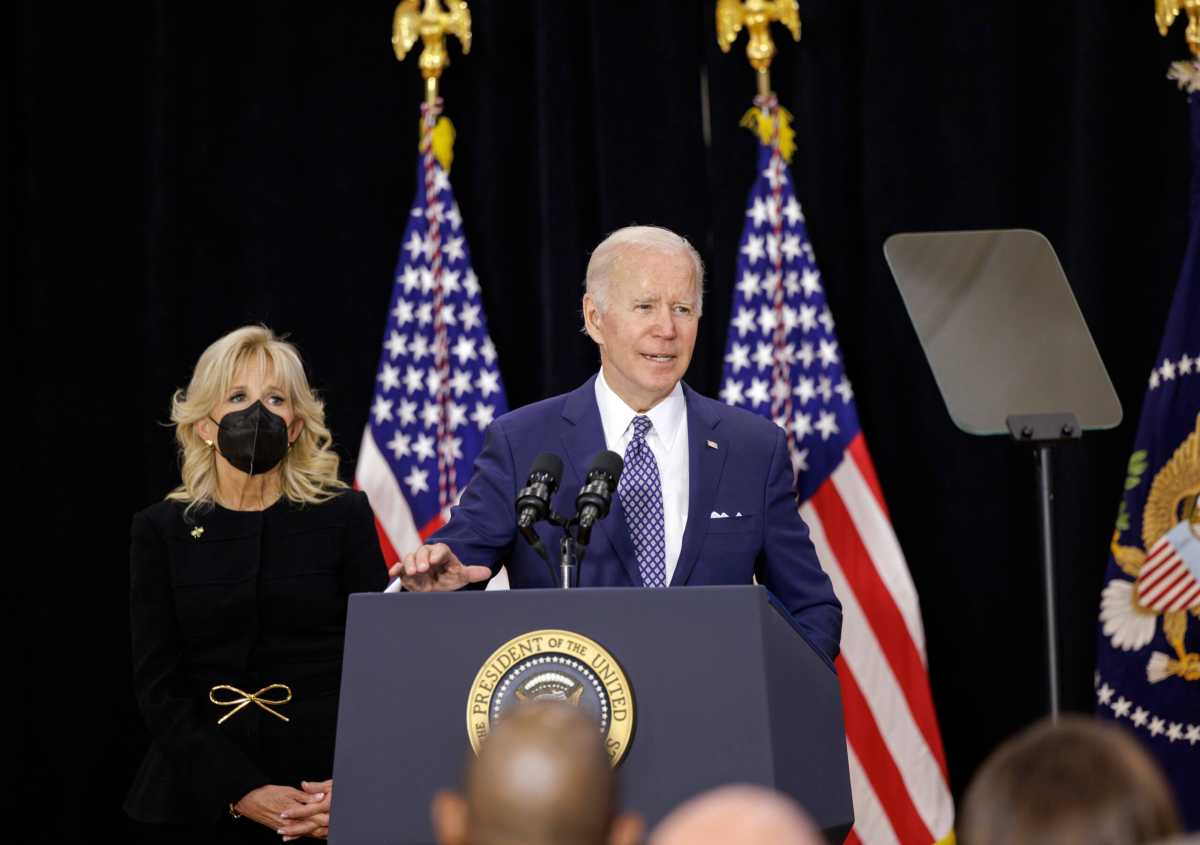United States President Joseph Biden said on Tuesday that his administration will continue, at the Ninth Summit of the Americas, to promoting democratic values and good governance that have been “a core component of the Summit of the Americas since the first Summit in 1994.”
With leaders at the Third Summit in 2001 articulating the principles that would later be embodied in the Inter-American Democratic Charter and pledging to further fight corruption that undermines democratic governance at the Eight Summit in 2018, Biden said “this Summit, with the theme ‘Building a Sustainable, Resilient, and Equitable Future,’ continue this tradition.
“Our administration and partners will push back against the threats to our democracies by fortifying democratic institutions, investing in civil society, strengthening independent media, and following through on a regional digital transformation that is transparent and equitable,” said Biden in a White House Fact Sheet on Tuesday, ahead of the week-long Ninth Summit of the Americas that is being held in Los Angeles, California.
Implementing the Inter-American Action Plan on Democratic Governance, the Biden administration announced the “Presidential Initiative for Democratic Renewal” at the December 2021 Summit of Democracy, and the Department of State and USAID have dedicated over US$477 million to support democracy, human rights, fighting corruption, and the rule of law in the Western Hemisphere.
“We will also advance the work of governments in the Western Hemisphere related to financial transparency and justice reform in line with the Summit for Democracy Year of Action,” the White House statement said.
It said its continued contributions will support the UN Convention Against Corruption (UNCAC) Implementation Review Mechanism and the Follow-Up Mechanism to the Inter-American Convention Against Corruption (MESICIC).
“A resilient, effective, and thriving civil society is an essential building block of democracy, fighting corruption, and inclusive, equitable development,” said the White House, adding that it will strengthen the Citizen Forum of the Americas “to build civil society’s capacity to engage with governments and monitor implementation of Summit commitments, and expand the Citizen Corruption Observatory, which provides technical assistance for civil society’s anti-corruption efforts.”
The Biden administration said it will also work alongside “like-minded partners—governments in the region and beyond, the international community, civil society, the private sector, and others—to advocate for protection of internationally-recognized human rights, such as freedom of expression and association.”
In addition, Biden said the United States will expand its Digital Communications Network – a cross-section of digital leaders, developers, influencers, educators and specialists – “to bridge the divide between digital, traditional media, and new media, to the Americas to enable local partners to better address disinformation.”
On Monday, a top Biden aide, who only wanted to be identified as senior administration official, said in a White House briefing that the president is looking forward to hosting the Ninth Summit of the Americas.
“The summit is an opportunity for us to come together as a hemisphere to tackle some of the top concerns of the people in the region, including obtaining and sustaining economic prosperity, climate change, the migration crisis and the COVID-19 pandemic,” the official said.
He said that the United States and regional governments have “worked hard” over the last several months to negotiate hemispheric consensus on political commitments in five key areas: democratic governance, health and resilience, climate change and environmental sustainability, the clean energy transition, and digital transformation.
The official said five documents will be released during the Summit, “reflecting an ambitious hemispheric consensus on everything from support for civil society to promoting digital connectivity.”
On Wednesday, the senior administration official said the theme will be investments in the region’s health and prosperity.
That is also when President Biden will arrive in Los Angeles and deliver a policy speech at the inaugural ceremony.
The official said the president will announce the Americas Partnership for Economic Prosperity, or the “Americas Partnership,” as part of the US’ efforts “to promote an equitable recovery in a hemisphere that is still reeling from the impacts of the COVID-19 pandemic.”
He said the Americas Partnership will focus on five areas: Reinvigorating regional economic institutions and mobilizing investment; investments to update the social contract between governments and their people; resilient supply chains; decarbonization, biodiversity and clean energy jobs; and sustainable and inclusive trade.
“The overall objective is to build our economies from the bottom up and the middle out by building on the foundation established by our free trade agreements with the region to better address inequality and lack of economic opportunity and equity,” the official said.
“As a part of the Americas Partnership, the president will put forward an ambitious reform of the Inter-American Development Bank, IDB, to better address the region’s development challenges,” he added. “Because the private sector has a central role to play, the United States will also seek an equity stake in IDB Invest — the bank’s private sector lending arm — to support the deployment of private capital and to help direct it where it will have the most impact.”
The senior administration official said Biden will also announce “well over” US$300 million in assistance for the region in food insecurity.
“And with some of the biggest food producers in the hemisphere, he will commit to working together to address food insecurity in the Americas,” he said.
The top official said Biden will also announce “ambitious initiatives” in health.
In addition to the nearly 70 million vaccines donated by the United States within the hemisphere — “without any strings attached — it’s going to be important that we also work with the countries of the region to prepare for future pandemics by supporting health workers and increasing their number, and bringing governments and the private sector together to support the manufacturing and production of vaccines right here in the hemisphere,” the senior official said.
In advance of the Vice President Kamala Harris’s meeting on Thursday with Caribbean Community (CARICOM) leaders, the top official said Biden will announce “a partnership on climate, resilience and adaptation with a region that looks to address the challenges of a region of the Americas that being, you know, mostly middle- or high-income is often left out by many of the development tools used by the G7, the G20, and the multilateral development banks to address many of these challenges.”
On migration, the official said President Biden will also preview a meeting he will hold on Friday with regional governments to sign the Los Angeles Declaration on Migration, “which is an unprecedented and ambitious step by the United States and regional partners to work together to address the migration crisis in a comprehensive manner.”
To close out Thursday, the senior administration official said the focus will be on energy security and climate smart recovery, which will include Harris’s meeting with CARICOM leaders, as well as the participation of Special Envoy John Kerry at the CEO Summit.
On Friday, the official said the focus will be on food security and collaborative migration management, with the Los Angeles Declaration.
“The president is going to use the Summit of the Americas to align regional leaders, the private sector and civil society behind this new and ambitious agenda, starting with the economic agenda for the region,” he said.
“And the summit is bringing thousands of people together to focus on some of the most important shared challenges and opportunities facing the hemisphere,” he added. “There is no other part of the world, and it is really why we are doing this — there is no other part of the world that impacts the security and prosperity of the United States more directly than the Western Hemisphere. We are joined not just by geography but also by economic ties, by democratic principles, by cultural connections and by familial bonds.
“And the summit is an opportunity for all of us to work towards addressing the core challenges that people in the region are facing, including here in the United States,” the senior administration official continued.
Despite initially indicating that he will not be attending this week’s Ninth Summit of the Americas in Los Angeles, Antigua and Barbuda Prime Minister Gaston Browne said late Monday that he will be joining some of his CARICOM colleagues in participating in the event to be hosted by President Biden.
Browne’s attendance brings to at last eight the number of CARICOM leaders who, after all, will be participate in the weeklong confab.
St. Vincent and the Grenadines Prime Minister Dr. Ralph Gonsalves is the only CARICOM leader who has publicly announced that he nor any other government minister will be attending the summit in protest over Washington’s decision not to invite the leaders of Cuba, Venezuela and Nicaragua.
An Antigua and Barbuda Government statement said that Prime Minister Browne, whose father died over the weekend, left Tuesday for Los Angeles for the summit that ends on Jun. 10.
Browne will be accompanied by his wife, Maria Browne, who will attend forums for First Ladies and wives attending the Summit, the statement said.
“Prime Minister Browne who had initially indicated that he will not be attending the Summit due to the Summit organizers’ unwillingness to invite the leadership of Cuba and Venezuela, said that CARICOM held a special caucus on the issue and decided that they should attend due to the United States softening position towards Cuba and Venezuela,” the statement said.
“We felt that, in good faith, at least, the United States has softened its position; so, we should attend,” Browne said. “We continue to advocate for additional changes. The United States would have said certain things to us in confidence. And we believe that, on that basis, that we could participate while, at the same time, agitating for additional changes – additional concessions for Cuba and Venezuela in particular.”
Browne said CARICOM leaders will use the opportunity to defend the Caribbean’s position, stating that the United States had shown some interest in the Caribbean during the height of the COVID-19 pandemic by providing vaccines and personal protective equipment (PPEs).
“I think they ought to go further,” he said. “And when you look at the fact that COVID is going to be endemic, there is going to be further economic damage on countries in the Caribbean.
“The United States should be helping us to put together a ‘post-COVID’ Marshall Plan to salvage our economies,” he added.
Browne said that the Caribbean needs “real, practical solutions” to its problems and that attendance at the summit is “an opportunity” to advocate on behalf of Caribbean people for “increased collaboration and support from the United States.”
The Antiguan leader said that one of the aims of his government at the summit will be to encourage President Biden to change the aggressive policy towards Cuba, in particular, and Venezuela.
He said that there is the need for hemispheric solidarity and not policies driven by any state in the United States, where a large percentage of Cubans reside, referring to Florida.
Earlier on Monday, Belize Prime Minister and chairman of the 15-member CARICOM grouping, John Antonio Briceño, said that he had been informed by the CARICOM Secretary General, Dr. Carla Barnett, that seven countries had already given a commitment to attend the weeklong summit, according to the Barbados-based Caribbean Media Corporation (CMC).
“Belize have, we have agreed that Belize will attend the Summit,” Briceno said, joining Trinidad and Tobago, Guyana and Suriname, whose leaders have publicly announced their attendance at the summit.
Briceno said that there’s a lot of issues that will need to be addressed during the summit, noting “we need to talk about the level of debt that countries especially developing countries like ours have been incurring because of the pandemic and what kind of support can we get from the developed countries so there are pressing issues that we need to discuss. Migration is another one and so many countries believe that it is in our interest to be able to attend.”
Gonsalves said he is not attending the summit, “because I don’t see what is to be gained from going.
“And as presently advised, as I say, I’m not supporting or sending anybody,” he said on national radio last Wednesday, adding “because if you invite me to come to your house, and I say, ‘as a matter of principle I ain’t coming, because you shouldn’t be excluding people’, how could I then send somebody else?”
The Vincentian leader had written to CARICOM leaders urging them to boycott the event, but Briceno said that, “after long discussions …we’ve decided to allow countries who want to participate to attend this Summit of the Americas”, CMC reported.
It said that, among the other regional leaders not likely to attend the event are Grenada’s Prime Minister Dr. Keith Mitchell, who is in the heat of a campaign for the June 23 general election.
Other countries in the Americas, including Mexico, have also raised concerns regarding their participation at the deliberations, insisting that the summit should be inclusive and not exclusive, according to CMC.
























